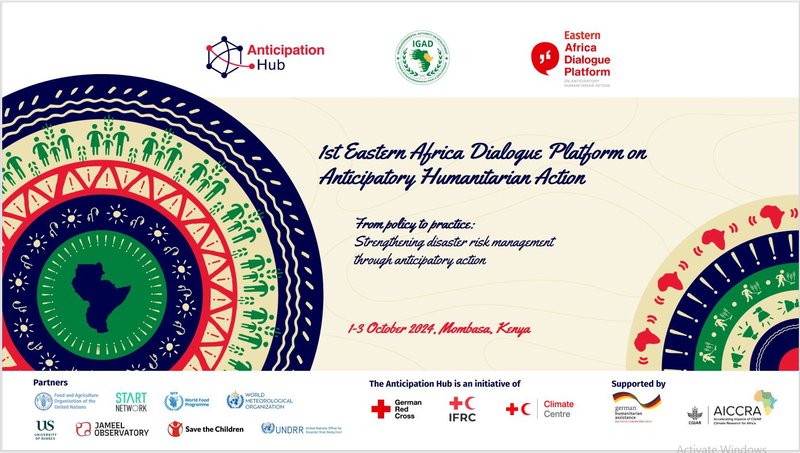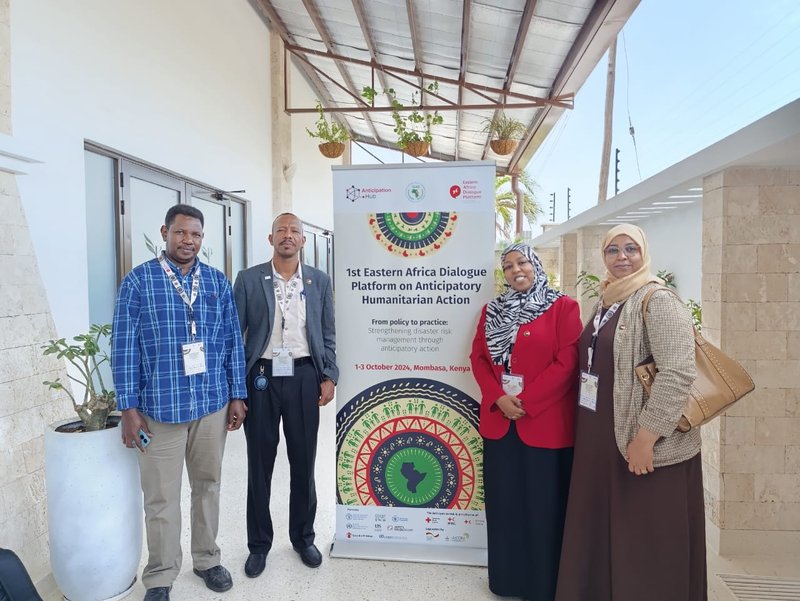Sudan Meteorological Authority Shines at Anticipatory Action Hub in Mombasa
Enhancing Weather Preparedness and Disaster Mitigation in East Africa

The Anticipatory Action Hub, organized by IGAD (ICPAC), was held in Mombasa, Kenya, from October 1st to 3rd, 2024, focusing on enhancing weather preparedness and disaster mitigation in East Africa.
brought together over 200 experts from government, UN Agencies, Red Cross Red Crescent Movement, humanitarian agencies, NGOs, national hydrological and meteorological services, Disaster Risk Management authorities, research and academia, and donor agencies and development partners. The hub aimed to enhance weather preparedness and disaster mitigation in the region.

From left to right: Dr. Abuelgasim Musa, Mr. Mohammed Elsheikh, Mrs. Dalal Humodi, Mrs. Rabah Farah
The Sudan Meteorological Authority (SMA), despite facing ongoing conflict, played a vital role, showcasing its dedication to supporting vulnerable communities through enhanced climate services.
A significant aspect of the Sudan Meteorological Authority (SMA) participation was their presentation titled "SMA: Delivering Early Warnings and Supporting Anticipatory Action – A Story of Resilience." This presentation underscored their vital role and commitment to providing life-saving information amidst challenging circumstances. A strong team of experts represented SMA:
Dr. Abuelgasim Musa
Mrs. Rabah Farah
Mrs Dalal Humodi
Mr. Mohammed Elsheikh
Beyond the presentation, SMA actively participated in the Technical Working Group dialogue (September 30 and October 4), sharing valuable insights and contributing to the development of key recommendations. This demonstrated their commitment to collaboration and their dedication to finding practical solutions to the challenges faced by communities across East Africa.
Key Themes from the Presentation:
- Resilience and Commitment: SMA's unwavering commitment to providing vital weather and climate information was evident. Despite losing access to their headquarters and data archives due to conflict, they implemented a rescue plan, successfully maintaining critical operations. This included establishing a new headquarters, opening offices in Egypt and at ICPAC, developing a modern, user-friendly website, and leveraging partnerships and alternative data sources. This resilience has been crucial in ensuring a 95% success rate in delivering timely and accurate early warning bulletins, directly contributing to improved preparedness and disaster mitigation.
- Adapting and Thriving: The SMA's ability to adapt and thrive in challenging circumstances is evident in their pioneering multi-risk impact-based forecast bulletins. These bulletins integrate weather, climate, and other relevant sectors to provide actionable information about risks such as drought, floods, heatwaves, and disease outbreaks. This innovative approach has significantly improved the accuracy and relevance of their forecasts.
- Collaboration and Partnerships: SMA's success relies heavily on strong partnerships. Their collaborations with organizations like WMO, CIMA Research Foundation, IGAD Climate Prediction and Application (ICPAC), Save the Children, NORCAP, Egypt Meteorological Authority (EMA), UNDRR, and others have been crucial in adapting projects to conflict situations and supporting multi-risk forecast production. This collaborative spirit has allowed the SMA to expand its reach and impact, serving a wider population and contributing to a more resilient East African region.
- Strengthening Capabilities: SMA is continuously striving to improve forecast accuracy and reliability. They are currently working with NORCAP experts to enhance the performance of their WRF model, a critical step in providing even more precise and timely forecasts. These efforts are expected to lead to increase in forecast accuracy, further strengthening their ability to protect vulnerable communities.
- Continued Impact and Future Directions: Despite the challenges, SMA continues to provide critical forecasts that support decision-making for drought management, flood preparedness, and public health. Looking ahead, SMA aims to expand its reach and collaborations, upgrade technology, and advocate for increased support for National Meteorological and Hydrological Services (NMHSs).
Panel Discussion Highlights:
During the panel discussion, SMA’s contributions were particularly impactful.
- Challenges in Early Warning Systems: SMA openly addressed the significant challenges they face in delivering accurate early warning systems that trigger timely anticipatory actions. They highlighted the need for comprehensive strategies involving governments, international organizations, and local communities to overcome these obstacles.
- Importance of Partnerships: SMA emphasized their proactive engagement with various stakeholders, including local communities and humanitarian agencies, to ensure that early warnings are relevant and actionable. They highlighted the importance of building trust and understanding with communities to ensure they can effectively utilize the information provided.
- Future Priorities: SMA outlined their urgent priorities for the next five years, focusing on enhancing the delivery of anticipatory actions and aligning these efforts with the goals of partner organizations. They stressed the importance of investing in technology, capacity building, and data sharing to further strengthen their ability to support vulnerable communities in the region.
Other participants, including EMI, ICPAC, UNMA, and FAO representatives, also discussed their strategies and challenges regarding data availability, partnerships, and capacity-building efforts. However, SMA’s emphasis on overcoming immediate challenges and its commitment to collaboration and community engagement resonated strongly throughout the discussion.
Overall, SMA's participation in the Anticipatory Action Hub underscored its pivotal role in enhancing weather preparedness and protecting communities from the impacts of climate change in East Africa. "Our commitment to serving our people is unwavering," said Dr. Abuelgasim, Head of the Early Warning Unit at the Sudan Meteorological Authority. "Despite the challenges we face due to the ongoing conflict, we are determined to provide the vital information communities need to protect themselves from the impacts of climate change." Through these efforts, SMA remains a cornerstone in the concerted regional initiatives to safeguard vulnerable populations.
As part of the broader engagement, SMA was featured in a television program on the third day, which explored anticipatory action in the region. The program emphasized the importance of a coordinated approach to disaster risk management and the essential role of financial resilience in supporting the continued development of early warning systems and community engagement.
Declaration and Future Steps
At the conclusion of the hub, participants issued a significant declaration, outlining key takeaways and future steps. Among the most critical points was the commitment to:
- Strengthen national and regional forecasting capabilities for effective early warning systems
- Promote community-led anticipatory action, particularly for vulnerable groups such as women, children, displaced populations, and those in conflict-affected areas
- Ensure Anticipatory Action frameworks respond to the needs of the most vulnerable
- Explore and expand anticipatory action in fragile and conflict-affected areas, as well as other hazards like heatwaves and urban contexts
- Strengthening Anticipatory Action Frameworks
- Improving Early Warning Systems and Community Engagement
- Scaling Up and Expanding Anticipatory Action
- Support from National Governments and the International Community
- Bolstering regional collaboration
- Enhancing financial mechanisms
- Ensuring that anticipatory action becomes a central pillar of disaster risk reduction strategies across East Africa
This declaration serves as a roadmap for future efforts, reinforcing the need for collective action and investment to protect vulnerable communities from the increasing impacts of climate change and other natural hazards.
Declaration from the First Eastern Africa Dialogue Platform on Anticipatory Action
DARAJA Sudan Emergency Forecasting and Early Warning Service Project
We are pleased to announce that, following this successful cooperation, we will commence the DARAJA Sudan Emergency Forecasting and Early Warning Service project under ICPAC's program: Accelerating Anticipatory Action through Implementation of Regional (Eastern Africa) Anticipatory Action Roadmap for Improved Preparedness for Humanitarian Action. This project is implemented in partnership with the Sudan Urban Development Think Tank (SUDTT) and is funded by the German Federal Office.
The Sudan Meteorological Authority's participation in the Anticipatory Action Hub in Mombasa marked a significant milestone in the region's efforts to enhance weather preparedness and disaster mitigation. The SMA's commitment to supporting vulnerable communities and its prominent role in the panel discussions and television programs feature demonstrate its dedication to advancing anticipatory actions in East Africa. As the region moves forward, the SMA remains a crucial partner in the collective effort to protect vulnerable communities from the increasing impacts of climate change and other natural hazards.

